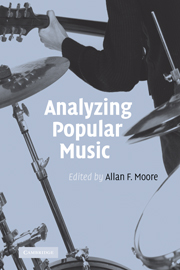Book contents
- Frontmatter
- Contents
- Acknowledgement
- Contributors
- 1 Introduction
- 2 Popular music analysis: ten apothegms and four instances
- 3 From lyric to anti-lyric: analyzing the words in pop song
- 4 The sound is ‘out there’: score, sound design and exoticism in The X-Files
- 5 Feel the beat come down: house music as rhetoric
- 6 The determining role of performance in the articulation of meaning: the case of ‘Try a Little Tenderness’
- 7 Marxist music analysis without Adorno: popular music and urban geography
- 8 Jethro Tull and the case for modernism in mass culture
- 9 Pangs of history in late 1970s new-wave rock
- 10 Is anybody listening?
- 11 Talk and text: popular music and ethnomusicology
- Bibliography
- Discography
- Film/Videography
- Index
9 - Pangs of history in late 1970s new-wave rock
Published online by Cambridge University Press: 22 September 2009
- Frontmatter
- Contents
- Acknowledgement
- Contributors
- 1 Introduction
- 2 Popular music analysis: ten apothegms and four instances
- 3 From lyric to anti-lyric: analyzing the words in pop song
- 4 The sound is ‘out there’: score, sound design and exoticism in The X-Files
- 5 Feel the beat come down: house music as rhetoric
- 6 The determining role of performance in the articulation of meaning: the case of ‘Try a Little Tenderness’
- 7 Marxist music analysis without Adorno: popular music and urban geography
- 8 Jethro Tull and the case for modernism in mass culture
- 9 Pangs of history in late 1970s new-wave rock
- 10 Is anybody listening?
- 11 Talk and text: popular music and ethnomusicology
- Bibliography
- Discography
- Film/Videography
- Index
Summary
In late 1977 Elvis Costello and the Attractions appeared on NBC's Saturday Night Live. At the time, the programme was in its early days, featuring John Belushi, Dan Ackroyd, Gilda Ratner, Jane Curtin and Garrett Morris – a cast who pushed at the boundaries of the permissible on US network television. The often-provocative show was well known to many rock listeners, especially since it regularly featured the most interesting current bands as musical guests. Any group appearing on the show during the late 1970s could expect to enjoy the attention of rock culture at least for the evening, and an appearance on the show could be especially beneficial for a new band like Costello's. But this particular appearance was distinctive in many ways. The band began a number and almost immediately broke it off, with Costello announcing that there was no reason to play that song; the group then launched into ‘Radio, Radio’, a tune strongly critical of the rock radio of the time; and since the show was live, there was no suitable way – short of going to black – for the show's producers to stop the band from switching tunes on the fly.
Substituting tunes mid-performance was clearly a rebellious act, and this rebelliousness was underscored that evening by many other aspects of the band's presentation and music.
- Type
- Chapter
- Information
- Analyzing Popular Music , pp. 173 - 195Publisher: Cambridge University PressPrint publication year: 2003
- 4
- Cited by



